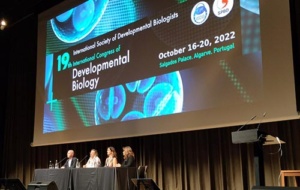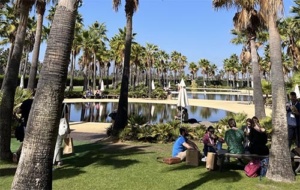International Congress of Developmental Biology
 Univ Old Members’ Trust Graduate Travel Report – Judy Sayers (2019, DPhil Chromosome and Developmental Biology)
Univ Old Members’ Trust Graduate Travel Report – Judy Sayers (2019, DPhil Chromosome and Developmental Biology)
I travelled to the Algarve, Portugal in October 2022 to present my research at the 19th International Congress of Developmental Biology. Organised by the International Society of Developmental Biologists (ISDB), this flagship conference is held once every four years in cities around the world. The 2022 conference brought together 750 scientists interested in developmental and regenerative biology from across the international community.
The congress involved a packed five-day schedule of talks and seminars from the most renowned academics in the developmental biology field. Alongside the central programme of excellent talks, a series of workshops and poster sessions provided ample opportunity to engage with graduate students, early-mid career researchers and senior scientists alike. The congress was particularly notable for the breadth of the programme. The congress was also very interdisciplinary, including talks from evolutionary biologists, embryologists, physicists, mathematicians and many others united by an interest in how embryos form, in how cells behave, and in how these processes relate to disease.
 I presented my research on regeneration of the so-called cardiac conduction system. The heart’s rhythmic contraction and relaxation cycle is controlled by specialised cells embedded in the muscle wall that make up the cardiac conduction system. Heart attacks are one of the leading causes of death in the world and occur when a coronary artery is blocked resulting in cell death and loss of a large portion of heart muscle. The lost muscle is replaced by non-contractile scar tissue and heart function is compromised. The cycles of contraction and relaxation are also compromised following this tissue damage. This results in irregular and unsynchronized heartbeats, which increase mortality risk for patients who have survived a heart attack. During my DPhil, I have investigated the molecular and cellular responses of the cardiac conduction system to heart injury. I presented the advanced imaging methods which I have developed to discern changes in the cardiac conduction system after heart attack. This has shed light on how the remodelling of the conduction system differs following heart attack between hearts that can regenerate after injury, versus hearts that undergo scar formation and pathological remodelling.
I presented my research on regeneration of the so-called cardiac conduction system. The heart’s rhythmic contraction and relaxation cycle is controlled by specialised cells embedded in the muscle wall that make up the cardiac conduction system. Heart attacks are one of the leading causes of death in the world and occur when a coronary artery is blocked resulting in cell death and loss of a large portion of heart muscle. The lost muscle is replaced by non-contractile scar tissue and heart function is compromised. The cycles of contraction and relaxation are also compromised following this tissue damage. This results in irregular and unsynchronized heartbeats, which increase mortality risk for patients who have survived a heart attack. During my DPhil, I have investigated the molecular and cellular responses of the cardiac conduction system to heart injury. I presented the advanced imaging methods which I have developed to discern changes in the cardiac conduction system after heart attack. This has shed light on how the remodelling of the conduction system differs following heart attack between hearts that can regenerate after injury, versus hearts that undergo scar formation and pathological remodelling.
I hugely enjoyed having this opportunity to talk about my research with other cardiac researchers and experts in regenerative biology. It was also wonderful to be exposed to such a breadth of biological research, to be confronted with challenges to long-standing theory in the field, and to be inspired by novel techniques that I might apply to my own ongoing research studies. I want to extend my warmest thanks to the Univ Old Members’ Trust for supporting my attendance at the conference.
Find out more about the range of travel grants and scholarships available to assist Univ students on our Travel Grants page or read further travel reports.
Judy was WCR President for 2020-2021, in September 2020 she featured in one of our Profile interviews.
Published: 7 February 2023
